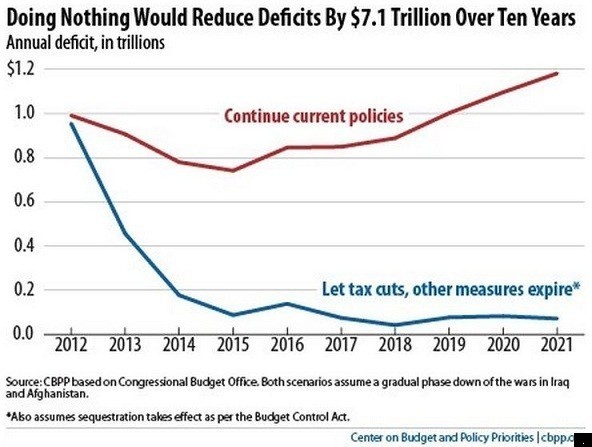
As a corollary to my earlier post on that Lori Montgomery article, let's remember that if 2011 was a year in which Congress did very little to address long-term structural deficits, that's great news -- especially if you actually want those long-term deficits to go down. And rather than suggest that what's needed is some sort of leader to emerge who takes the reins of the debate and wastes another year on a problem that's not a paramount concern of ordinary Americans, we should encourage those leaders to stand down, focus on joblessness, or failing that, take up a hobby. Anything besides trying to do more deficit stuff!
... if Republicans and Democrats keep failing to agree on this stuff for the next year and change, the result will be an extraordinary decrease in federal deficits — many multiples of what the Super Committee was tasked with finding.
We’ve been over this before, but the point is actually stronger now than it was earlier this year, because of the outcome of the debt limit fight. Between the looming expiration of the Bush tax cuts and other temporary tax provisions ($4.8 trillion), a large, scheduled drop in Medicare physician reimbursement rates ($300 billion), the soon-to-be triggered penalties for Super Committee failure ($1.2 trillion), and the resulting savings on servicing the national debt ($900 billion), deficits are set to drop by over $7 trillion automatically, unless Congress affirmatively stops it. That’s on top of the $1 trillion-plus dollars Congress banked in the debt ceiling fight.
Let's go to the chart from the Center on Budget and Policy Priorities:

So, there's no reason at all to lament a year lost to partisan gridlock, at least where the deficit is concerned. The less Congress does, the better it gets, and a "grand bargain" on deficit reduction would be a terrible thing for the country. We should be having a short-term debate on if, how and where money can be spent productively to curb the massive unemployment crisis in America. When that crisis is over, we can happily return to a debate over the long-term budget trajectory, and probably discover that it's not as huge a crisis as we were led to believe.
[Would you like to follow me on Twitter? Because why not?]
